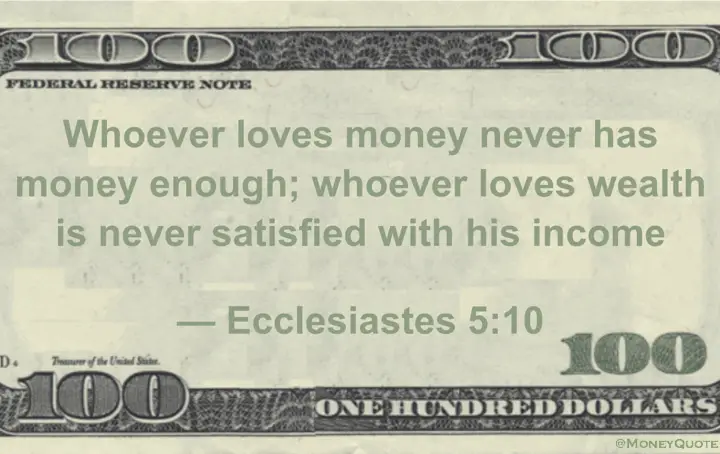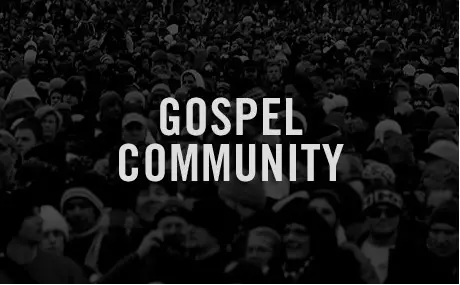Whoever loves money never has money enough; whoever loves wealth is never satisfied with his income. This too is meaningless.
Ecclesiastes 5:10
Launchpad #1
Three launchpads for meditation. The first explores how the main idea of this verse is fleshed out in its immediate context. Simply put, money never fulfills, and wealth never satisfies. Gaining more only leads to a desire to gain even more and more. As David Hubbard writes in his commentary, “there is something about the drive to acquire that impels us to seek more and more. If it is insecurity that prods us to seek wealth, wealth itself will not cure that insecurity. If it is the desire for power that pushes us, money will not quell that desire.”
Whatever the underlying desire is, more wealth is never satisfies. Unlimited desire meets the harsh reality of hard constraints, which is what verses 11 and 12 explore: “The more you have, the more people come to help you spend it. So what good is wealth—except perhaps to watch it slip through your fingers! People who work hard sleep well, whether they eat little or much. But the rich seldom get a good night’s sleep.”
In the immediate context, and as we will see later, in the context of the book, the critique of loving money and wealth is not a moral one. It is a practical one. More money can mean more problems. Friends and family become freeloaders. So what good is money, except, perhaps, to watch it flow to your fair-weather friends?
The second drawback of wealth that the critic points to is how it can produce stress. While the common laborer sleeps well at night, the rich are restless in their sleeplessness. Although not explicitly mentioned in the text, there are several potential ways wealth could prompt sleeplessness: stress over possessions being stolen, planning for a lavish party, a lack of tiredness from a life of ease, and concerns about how an investment will turn out are just some of the possibilities.
So, the meaninglessness of loving money and wealth explored in Ecclesiastes 5:10 is not a moral critique of loving wealth like is found elsewhere in the Bible. It is a practical critique. It is meaningless to love money and wealth because they are never enough; they will never fully satisfy.
Launchpad #2
The second launchpad for meditation is a study of the word translated as meaningless and how it connects with the whole book of Ecclesiastes. The Hebrew word is ‘hebel’. It occurs 38 times in Ecclesiastes, making up more than half of all its occurrences in the Bible. Clearly, the word is central to understanding the book.
Its basic meaning is breath, smoke, or vapor. Painting a picture with a single word, the visual metaphor of ‘hebel’ portrays life as momentary, difficult to grasp, and confusing.
Throughout the book, the critic uses the word ‘hebel’ to describe the things in life that we seek satisfaction in apart from God: pleasure, status, and wealth for example. It is not that these things are necessarily bad, but rather that in comparison to God they are fleeting and empty. Trying to find ultimate satisfaction in them is like trying to grab a hold of smoke. It will slip right through your fingers.
Ecclesiastes 5:10 fits within the critic’s critique of wealth. Pursuing wealth is ‘hebel’. To see how pursuing wealth is ‘hebel’, I will simply read Ecclesiastes 5:10-6:2 and let the critic speak for himself: “Whoever loves money never has money enough; whoever loves wealth is never satisfied with his income. This too is meaningless. The more you have, the more people come to help you spend it. So what good is wealth—except perhaps to watch it slip through your fingers! People who work hard sleep well, whether they eat little or much. But the rich seldom get a good night’s sleep. There is another serious problem I have seen under the sun. Hoarding riches harms the saver. Money is put into risky investments that turn sour, and everything is lost. In the end, there is nothing left to pass on to one’s children. We all come to the end of our lives as naked and empty-handed as on the day we were born. We can’t take our riches with us. And this, too, is a very serious problem. People leave this world no better off than when they came. All their hard work is for nothing—like working for the wind. Throughout their lives, they live under a cloud—frustrated, discouraged, and angry. Even so, I have noticed one thing, at least, that is good. It is good for people to eat, drink, and enjoy their work under the sun during the short life God has given them, and to accept their lot in life. And it is a good thing to receive wealth from God and the good health to enjoy it. To enjoy your work and accept your lot in life—this is indeed a gift from God. God keeps such people so busy enjoying life that they take no time to brood over the past. There is another serious tragedy I have seen under the sun, and it weighs heavily on humanity. God gives some people great wealth and honor and everything they could ever want, but then he doesn’t give them the chance to enjoy these things. They die, and someone else, even a stranger, ends up enjoying their wealth! This is meaningless—a sickening tragedy.”
Launchpad #3
The third launchpad for mediation mulls over how Ecclesiastes fits within the broader Hebrew wisdom literature. The above passage seems bleak, perhaps even cynical. More wealth means more problems. Friends become freeloaders and savings become sour.
The message of Ecclesiastes is so bleak that it can seem to contradict the wisdom of Proverbs. In Proverbs, wealth fosters friendships and saving is wise. For example, Proverbs 19:4 reads “Wealth attracts many friends, but a poor man is separated from his friends” and Proverbs 21:20 reads “The wise store up choice food and olive oil, but fools gulp theirs down.” Are these contradictions?
No, rather than contradicting each other, the different portraits of wisdom in Proverbs and Ecclesiastes complement each other. Yes, saving for the future is generally a wise thing to do, as the book of Proverbs suggests. But, as Ecclesiastes explores, saving for the future is not ultimately what satisfies. Wise living does often lead to greater wealth, but it is unwise to worship the wealth and miss out on being satisfied in God. Ecclesiastes and Proverbs complement one another to give us a sophisticated and realistic picture of how to live well in this world.

